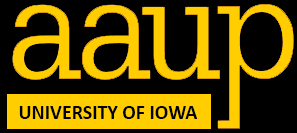Resources
-
In August 2025, the Iowa Board of Regents updated its policy on academic freedom. Faculty may still teach “controversial subjects” related to a course’s subject, but they must “are expected to uphold academic integrity, encourage open and respectful inquiry, and present coursework in a way that reflects the range of scholarly views and ongoing debate in the field.”
-
“Applying equally to all faculty members, regardless of position or rank (e.g., tenure-track, clinical-track, instructional-track, research-track), these policies support your freedom to discuss matters relating to your instructional and scholarly activities, even if some may disagree or even disapprove of your statements.”
-
“The basic functions of the university are the advancement and dissemination of knowledge, the development of critical intelligence, and the education of citizens and professional workers for the society of which the university is a part. . . .
The indispensable condition for the successful discharge of these functions is an atmosphere of intellectual freedom. . . . “
-
“For more than half a century the American Association of University Professors has acted upon two principles: that colleges and universities serve the common good through learning, teaching, research, and scholarship; and that the fulfillment of these functions necessarily rests upon the preservation of the intellectual freedoms of teaching, expression, research, and debate.All components of the academic community have a responsibility to exemplify and support these freedoms in the interests of reasoned inquiry. . . .
Continuing attacks on the integrity of our universities and on the concept of academic freedom itself come from many quarters. These attacks, marked by tactics of intimidation and harassment and by political interference with the autonomy of colleges and universities, provoke harsh responses and counter-responses. Especially in a repressive atmosphere, the faculty’s responsibility to defend its freedoms cannot be separated from its responsibility to uphold those freedoms by its own actions.”
-
“Freedom to teach and freedom to learn are inseparable facets of academic freedom. The freedom to learn depends upon appropriate opportunities and conditions in the classroom, on the campus, and in the larger community. Students should exercise their freedom with responsibility.”
-
In 2025, the AAUP’s Committee A issued a new policy guidance on institutional neutrality. The policy does not call for the total withdrawal from public debate. There may be moments when a University statements on a particular issues is necessary to preserve institutional independence, professional integrity, and academic freedom.
“A university’s decision to speak, or not; to limit its departments or other units from speaking; to divest from investments that conflict with its mission; or to limit protest in order to promote other forms of speech are all choices that might either promote or inhibit academic freedom and thus must be made with an eye to those practical results, not to some empty conception of neutrality. The defense of academic freedom has never been a neutral act.”
-
“The proportion of faculty who are appointed each year to tenure-line positions is declining at an alarming rate. Because faculty tenure is the only secure protection for academic freedom in teaching, research, and service, the declining percentage of tenured faculty means that academic freedom is increasingly at risk. Academic freedom is a fundamental characteristic of higher education, necessary to preserve an independent forum for free inquiry and expression and essential to the mission of higher education to serve the common good. This report examines the costs to academic freedom incurred by the alarming current practice of the steady elimination of tenure.”
-
This paper comes from the Center for the Defense of Academic Freedom.
“This informational guide is primarily intended for National Science Foundation (NSF)–funded principal investigators if NSF requests a change in your work. The level of detail assumes the reader has basic familiarity with the NSF’s two main review criteria (intellectual merit and broader impacts), in addition to the NSF’s Proposal & Award Policies & Procedures Guide (PAPPG). However, this guide may also be relevant to research administrators, legal experts, or awards from other funding agencies such as the National Institutes of Health (NIH), given that the Code of Federal Regulations (CFR) applies to all agencies, not just the NSF. “
-
This paper comes from the Center for the Defense of Academic Freedom.
“Freedom of Information (FOI) laws are important for a robust democracy and to hold those in power accountable. However, some partisan activists have used FOI laws to harass faculty at public universities and to discourage or discredit faculty research and teaching they don’t like (Polsky 2019). This typically involves submitting FOI requests for records of a particular faculty member’s research activities, class material and syllabi, and communications, whether emails or other records stored on university servers. Here, we suggest how public universities and their faculty can take precautions to reduce the risk of FOI-facilitated faculty harassment.”
